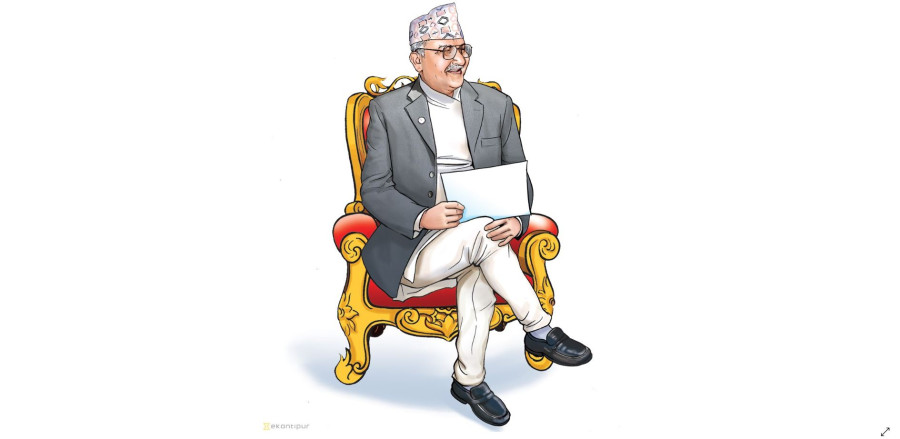Opinion
Restoring democracy back to the default
Prime Minister Oli opened too many battlefronts, now he may be succumbing to his own ambitions.
Ajaya Bhadra Khanal
Several significant trends are occurring in recent years that show that we should not take democracy for granted. Although we have a democratic constitution, it has only served, so far, to legitimise political malpractices. Policies and practices adopted by the government and parties are not always democratic; they consistently undercut the interests of the country and its people. Geo-political conflict is making this process even more muddled.
Recent incidents show that Prime Minister KP Sharma Oli may be succumbing to his own ambitions. If Oli is overwhelmed by the fronts he has created, things could unravel very quickly. It is, therefore, necessary for the prime minister to restore democracy’s default settings.
Only transparency, openness and vigorous debate in the public sphere can protect national interests from being undercut by vested domestic or foreign interests.
Inherent contradictions
While the current regime appears to value peace and stability—even dictatorships do—it has been portraying democracy as a threat to peace and stability.
Our state and society are riddled with corruption and impunity. A democratic system, in such a situation, provides legitimacy to the ruling regime, however imperfect it may be. More importantly, it allows the ruling regime to make selective use of the rule of law to control opposition and opponents.
The ruling party’s behaviour displays an interesting contradiction. On the one hand, it claims that the new constitution has ushered in an era of democracy and freedom and that there is no longer a need to fight for democracy. On the other hand, the government has been portraying democracy and freedom as a threat to peace and stability and is making a series of attempts to stifle transparency, freedom of expression and civil rights.
One of Oli’s claims—also reflected in his party’s electoral manifesto—is that peace and stability is needed for economic development, which in turn is the only way to ensure long term peace and stability.
Studies, especially those by economists like Daron Acemoglu, have now amply demonstrated the links between democracy and social unrest. In the short term, political parties selectively use redistribution to appease the voters and the intermediate classes who are crucial in propping up a political regime.
Over the longer term, however, democracy matters. Democracy adds about 20 percent to a country’s per capita GDP and is the most effective means of maintaining social stability. Hong Kong’s experience, for example, shows that that absence of economic development may not be the only driver of social unrest.
Legislation and freedom of expression
Over the course of the past year, the government has introduced several bills in the federal parliament that seek to limit the freedom and rights of Nepalis. The bills introduced recently have a common trait. All of them allow space for the government to selectively abuse ‘rule of law’ provisions to crack down on targeted individuals. One of those bills, for example, allows state agencies to spy on Nepali citizens without sufficient safeguards to control the misuse of such powers.
Instead of state agencies pursuing investigations based on reasonable grounds that indicate violation of the rule of law, their actions are now more and more guided by the need for political control.
Similarly, the government is trying to centralise authority regarding the police, media and the civil society by creating new agencies and units under the executive, rather than empowering autonomous and independent institutions.
As a result, many people in the civil society and the political parties are restraining their voices and practicing self-censorship. If the fear of retribution persists, soon there will be very few people who will be able to speak freely.
Is Oli toning down?
In recent years, the prime minister has opened several fronts: against the West, against civil society organisations, against political parties promoting the agenda of inclusion and identity, against political opponents, against financial interests not aligned with the ruling regime, and against India.
Oli could, however, be toning down after a worsening medical condition. According to party leaders, he is no longer aggressively pursuing ‘rule of law’ strategies to crack down on the political rivals, especially those within his own party. At one point in the past, Prime Minister Oli had gone to the extent of dragging Nepal Communist Party leader Madhav Kumar Nepal to the Commission for the Investigation of Abuse of Authority (CIAA) in relation to a corruption scandal involving the privatisation of government land.
He also appears to have lost the battle to appease the US without appearing to be supporting the Indo-Pacific Strategy (IPS). The government has persistently tried to frame the Millennium Challenge Corporation Compact as being separate from the IPS. But now, the ruling party is likely to endorse the compact despite clear communications by the US that although it is not a military alliance, it is a part of the IPS.
KP Oli appears to be facing more difficulties maintaining control over both the party and the government. In recent days, he appears to have relented to former Maoist leader Pushpa Kamal Dahal over party affairs as well as over the pressing issue of the election of a new speaker for the federal parliament.
Oli also appears more flexible regarding the case of the MCC, withholding of bills in Parliament, and the increased effort to maintain a working relationship with western countries including the United States and the European Union.
There’s a clear indication that Oli may have opened too many war-fronts, which are likely to overwhelm him now that his health is weak and those close to him are finding opportunities to rule by proxy.
People of a country like Nepal, which has just passed through a prolonged period of social and political unrest, should appreciate the value of peace and stability. Peace and stability in a country like Nepal, with different kinds of social and power inequalities, requires a functioning democracy.




 11.42°C Kathmandu
11.42°C Kathmandu.jpg)










